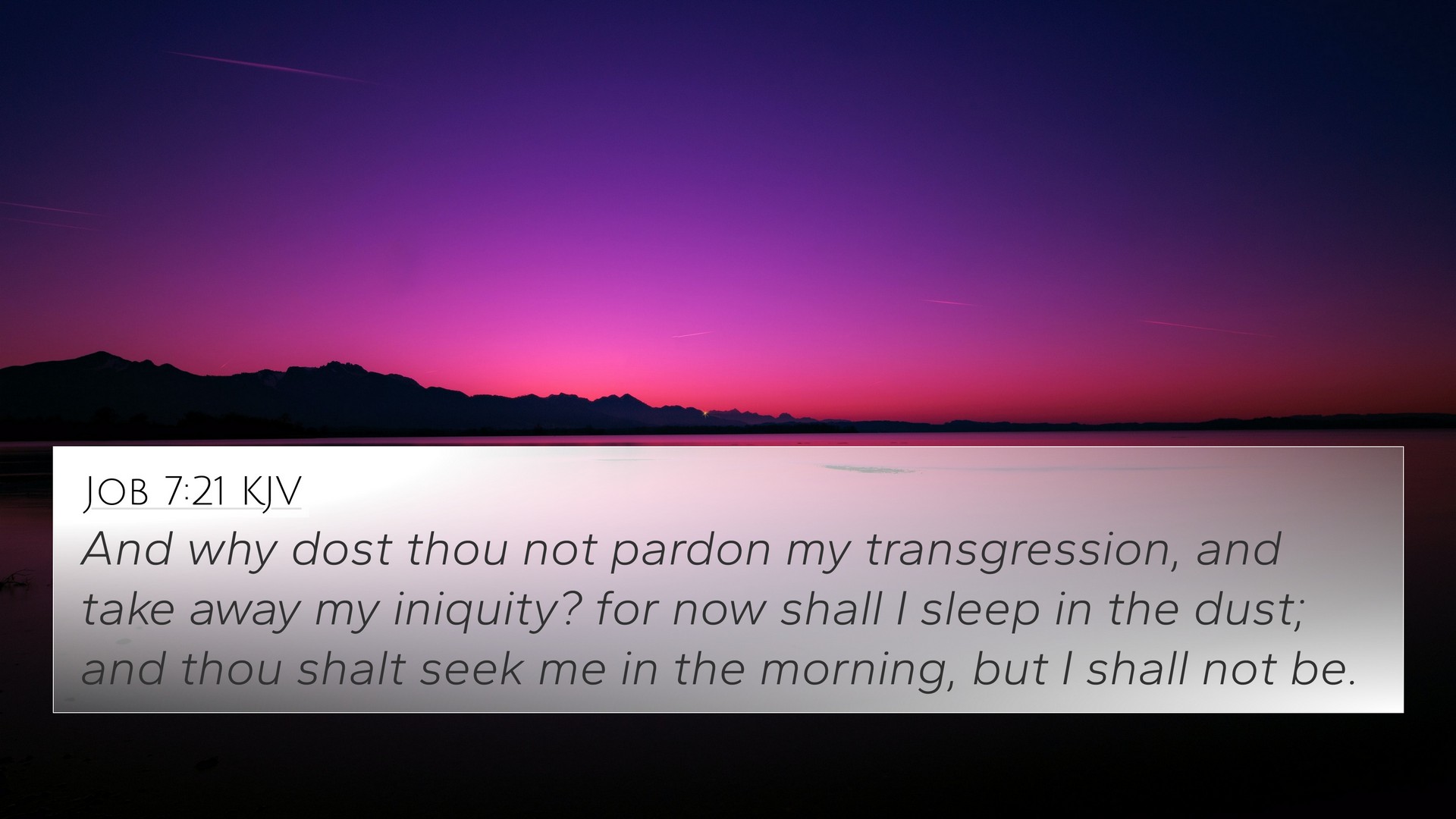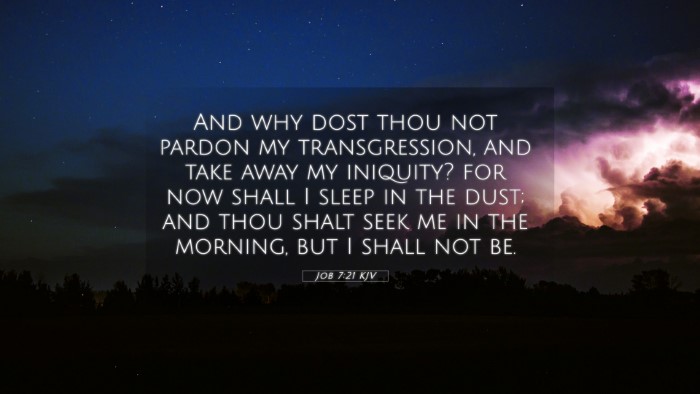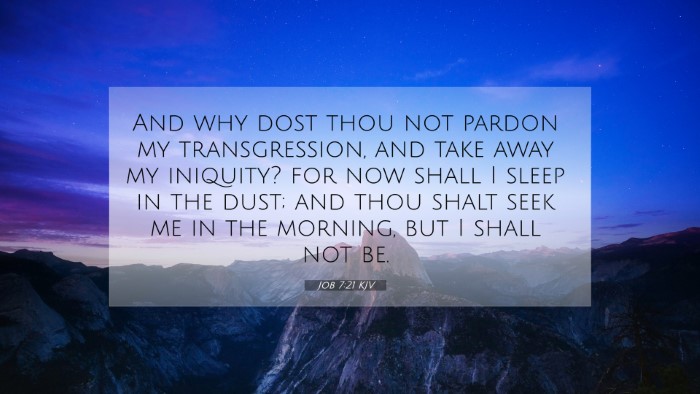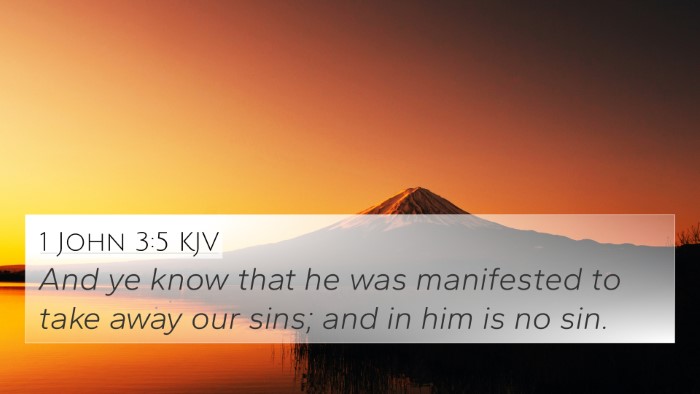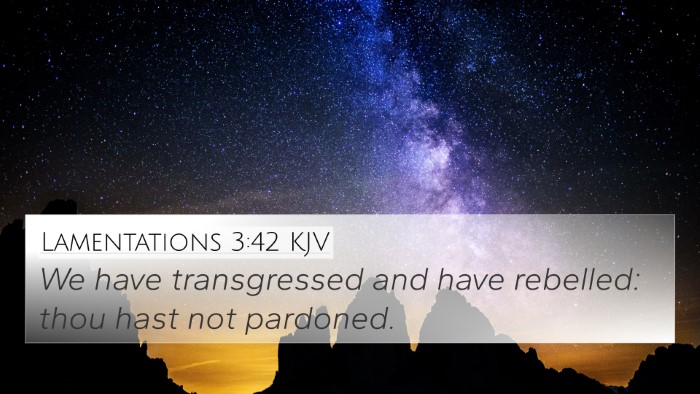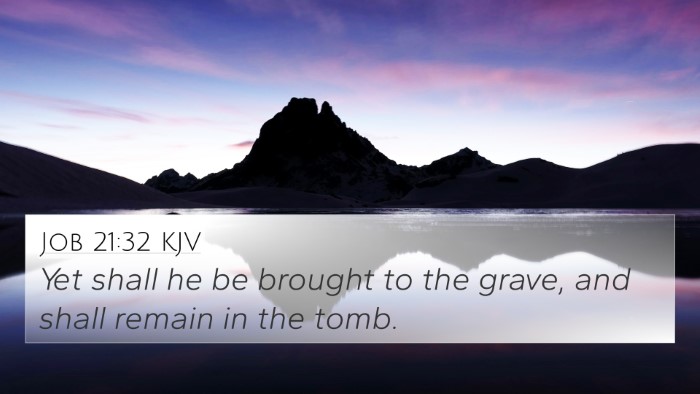Old Testament
Genesis Exodus Leviticus Numbers Deuteronomy Joshua Judges Ruth 1 Samuel 2 Samuel 1 Kings 2 Kings 1 Chronicles 2 Chronicles Ezra Nehemiah Esther Job Psalms Proverbs Ecclesiastes Song of Solomon Isaiah Jeremiah Lamentations Ezekiel Daniel Hosea Joel Amos Obadiah Jonah Micah Nahum Habakkuk Zephaniah Haggai Zechariah MalachiJob 7:21 Similar Verses
Job 7:21 Cross References
And why dost thou not pardon my transgression, and take away my iniquity? for now shall I sleep in the dust; and thou shalt seek me in the morning, but I shall not be.
Uncover the Rich Themes and Topics of This Bible Verse
Listed below are the Bible themes associated with Job 7:21. We invite you to explore each theme to gain deeper insights into the Scriptures.
Job 7:21 Cross Reference Verses
This section features a detailed cross-reference designed to enrich your understanding of the Scriptures. Below, you will find carefully selected verses that echo the themes and teachings related to Job 7:21 KJV. Click on any image to explore detailed analyses of related Bible verses and uncover deeper theological insights.

Daniel 12:2 (KJV) »
And many of them that sleep in the dust of the earth shall awake, some to everlasting life, and some to shame and everlasting contempt.

1 John 1:9 (KJV) »
If we confess our sins, he is faithful and just to forgive us our sins, and to cleanse us from all unrighteousness.
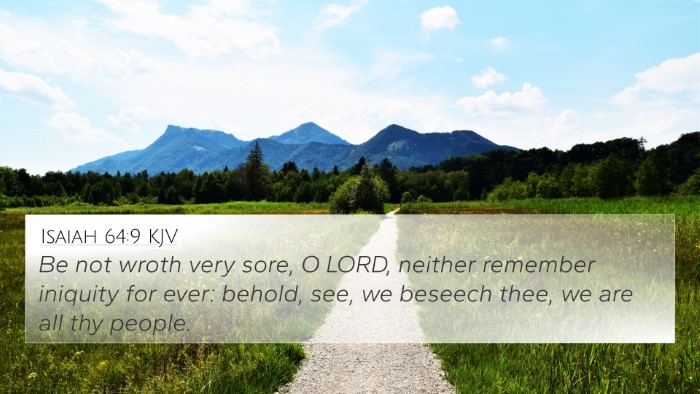
Isaiah 64:9 (KJV) »
Be not wroth very sore, O LORD, neither remember iniquity for ever: behold, see, we beseech thee, we are all thy people.

Ecclesiastes 12:7 (KJV) »
Then shall the dust return to the earth as it was: and the spirit shall return unto God who gave it.

Job 17:14 (KJV) »
I have said to corruption, Thou art my father: to the worm, Thou art my mother, and my sister.
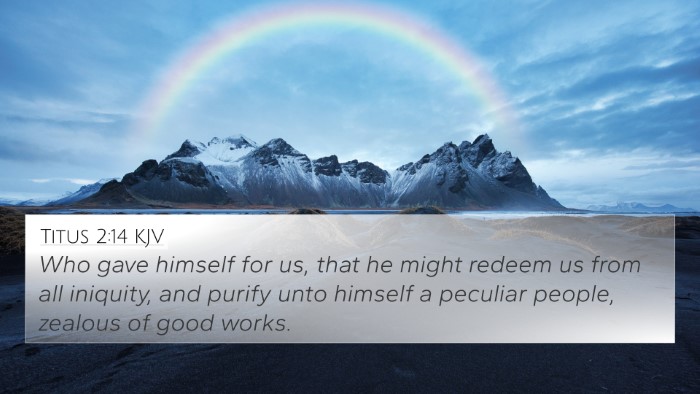
Titus 2:14 (KJV) »
Who gave himself for us, that he might redeem us from all iniquity, and purify unto himself a peculiar people, zealous of good works.

John 1:29 (KJV) »
The next day John seeth Jesus coming unto him, and saith, Behold the Lamb of God, which taketh away the sin of the world.
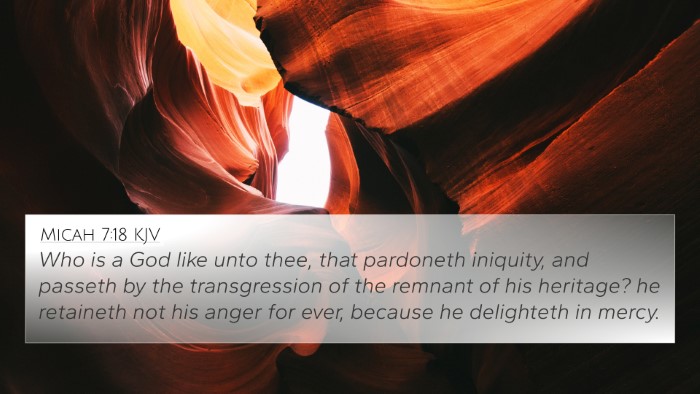
Micah 7:18 (KJV) »
Who is a God like unto thee, that pardoneth iniquity, and passeth by the transgression of the remnant of his heritage? he retaineth not his anger for ever, because he delighteth in mercy.
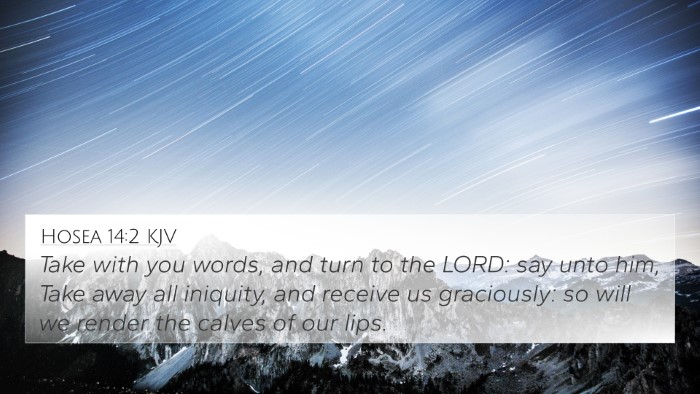
Hosea 14:2 (KJV) »
Take with you words, and turn to the LORD: say unto him, Take away all iniquity, and receive us graciously: so will we render the calves of our lips.
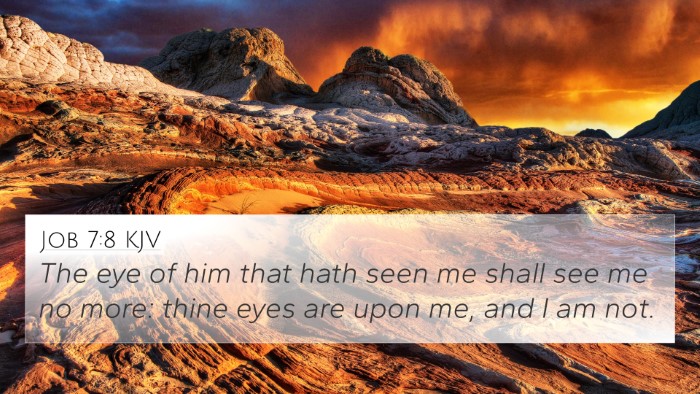
Job 7:8 (KJV) »
The eye of him that hath seen me shall see me no more: thine eyes are upon me, and I am not.

Job 10:9 (KJV) »
Remember, I beseech thee, that thou hast made me as the clay; and wilt thou bring me into dust again?
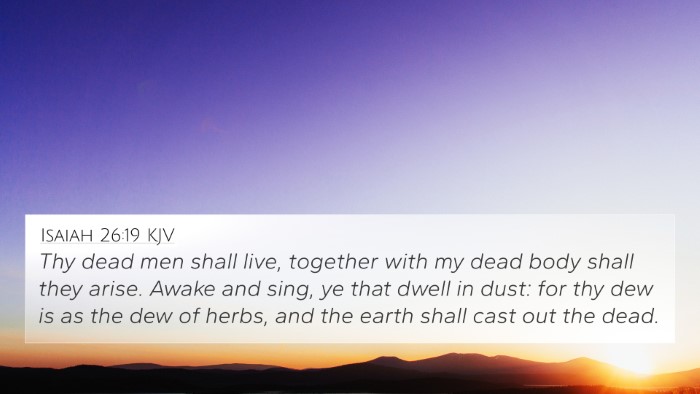
Isaiah 26:19 (KJV) »
Thy dead men shall live, together with my dead body shall they arise. Awake and sing, ye that dwell in dust: for thy dew is as the dew of herbs, and the earth shall cast out the dead.
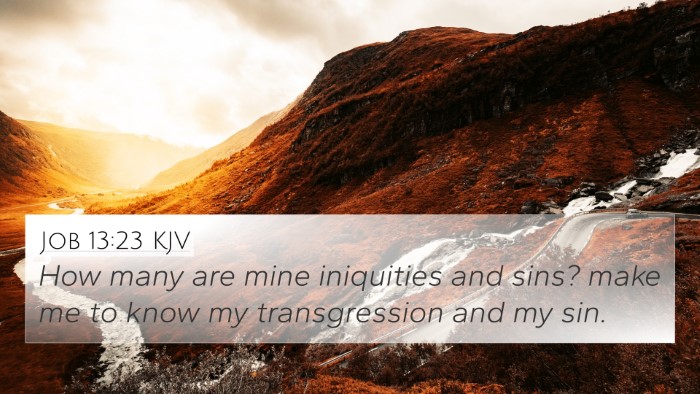
Job 13:23 (KJV) »
How many are mine iniquities and sins? make me to know my transgression and my sin.
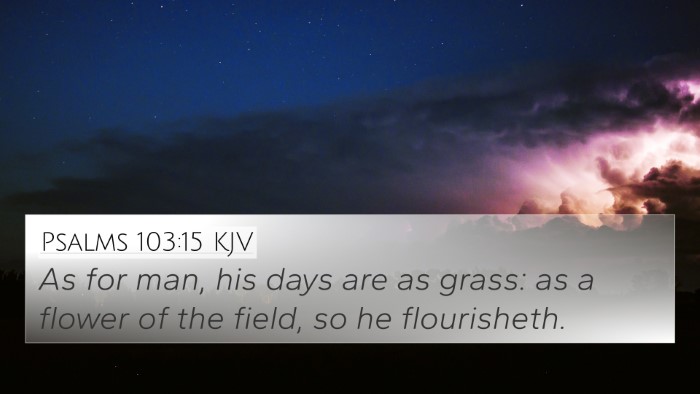
Psalms 103:15 (KJV) »
As for man, his days are as grass: as a flower of the field, so he flourisheth.

Psalms 37:36 (KJV) »
Yet he passed away, and, lo, he was not: yea, I sought him, but he could not be found.

Job 3:13 (KJV) »
For now should I have lain still and been quiet, I should have slept: then had I been at rest,
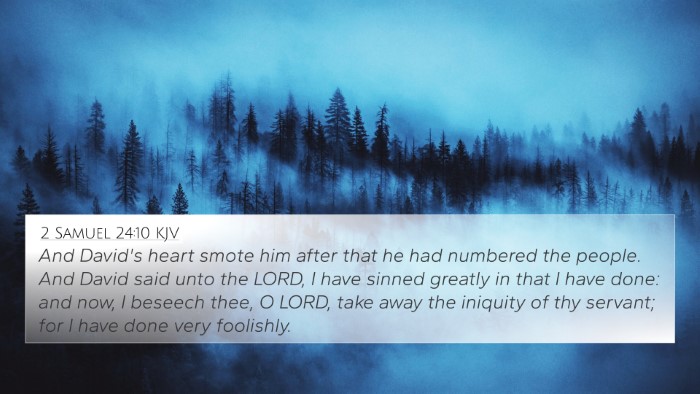
2 Samuel 24:10 (KJV) »
And David's heart smote him after that he had numbered the people. And David said unto the LORD, I have sinned greatly in that I have done: and now, I beseech thee, O LORD, take away the iniquity of thy servant; for I have done very foolishly.
Job 7:21 Verse Analysis and Similar Verses
Meaning of Job 7:21
Job 7:21 states: "Why then dost thou not pardon my transgression, and take away my iniquity? for now shall I sleep in the dust; and thou shalt seek me in the morning, but I shall not be." This verse encapsulates Job's deep longing for forgiveness and his awareness of mortality.
Contextual Overview
In this passage, Job speaks during his time of suffering and despair. His plea for forgiveness reflects the broader themes of human frailty and divine justice. Job is grappling with his understanding of suffering and the silence of God amid his trials.
Commentary Insights
Various public domain commentators provide deep insights into this verse:
-
Matthew Henry:
Henry highlights Job's desperation for God’s mercy, illustrating the intense turmoil within Job’s spirit as he yearns for absolution. He points out that Job feels the weight of his transgressions, seeking understanding and relief from his burdens.
-
Albert Barnes:
Barnes emphasizes the rhetorical nature of Job's questioning. He suggests that Job feels abandoned, reflecting a common human struggle with sin, guilt, and the hope of divine reconciliation. Barnes notes how Job wishes to prevent impending death without having resolved matters with God.
-
Adam Clarke:
Clarke elaborates on the existential despair embodied in this verse. He discusses the notion of guilt and divine justice, emphasizing that Job's words reveal his inner conflict. Clarke also notes the poetic elements of Job's lament and how it connects to the larger narrative of suffering and faith.
Thematic Connections
Job 7:21 brings forth several themes which can be linked to other scriptures, showing the interconnectedness of the Bible through thematic verse connections:
- Psalm 32:5: "I acknowledged my sin unto thee, and mine iniquity have I not hid." This verse parallels Job's calling for forgiveness, emphasizing confession and the hope of pardon.
- Isaiah 1:18: "Come now, and let us reason together, saith the Lord: though your sins be as scarlet, they shall be as white as snow." Here, we see God's promise of forgiveness echoing Job's desires.
- Romans 6:23: "For the wages of sin is death; but the gift of God is eternal life through Jesus Christ our Lord." This highlights the sobering reality of sin and the hope offered through Christ, resonating with Job’s lament over his mortality.
- Hebrews 9:27: "And as it is appointed unto men once to die, but after this the judgment." Job’s acknowledgment of impending death connects with the New Testament’s teaching on mortality and judgment.
- 2 Corinthians 5:10: "For we must all appear before the judgment seat of Christ; that every one may receive the things done in his body, according to that he hath done, whether it be good or bad." Job's fear of facing God reflects this New Testament teaching.
- Matthew 5:23-24: "Therefore if you bring your gift to the altar, and there remember that your brother has something against you, leave your gift there before the altar and go your way; first be reconciled to your brother..." Job's desire for reconciliation resonates with the call to seek restoration before facing God.
- 1 John 1:9: "If we confess our sins, he is faithful and just to forgive us our sins, and to cleanse us from all unrighteousness." This New Testament verse underscores the assurance of God’s forgiveness that Job longs for.
Cross-Referencing Job 7:21
When cross-referencing Biblical texts, Job 7:21 provides a rich dialogue with various verses, deepening understanding and enhancing study. Here’s how to engage with these connections:
- Exploring Biblical Themes: Understanding the themes of suffering, repentance, and divine justice can enhance one’s interpretation of Job 7:21.
- Utilizing Tools for Cross-Referencing: Employ a Bible concordance or a cross-reference Bible study guide to unearth related scriptures and facilitate detailed comparative Bible verse analysis.
- Identifying Connections: Look into how Job’s plea connects to various narratives across the Old and New Testaments, enriching the reader's comprehension.
- Cross-Reference Bible Study Methods: By using cross-reference methods, one can see the broader scriptural context and thematic parallels inherent in the text.
Conclusion
Job 7:21 serves as a poignant reminder of humanity's struggle with sin, the quest for forgiveness, and the overarching theme of divine mercy. The cross-referenced verses help to establish a dialogue between various parts of Scripture, showcasing the interconnectedness of biblical texts which enhances both personal study and corporate understanding of God's Word.
